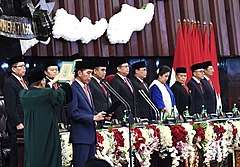Joko Widodo
Joko Widodo (born Mulyono,[1] 21 June 1961), also known as Jokowi, is an Indonesian politician who is the 7th and current president of Indonesia. Elected in July 2014 as the first president not to come from an elite political or military background, he was previously the Mayor of Surakarta from 2005 to 2012, and the Governor of Jakarta from 2012 to 2014.
Joko Widodo | |
|---|---|
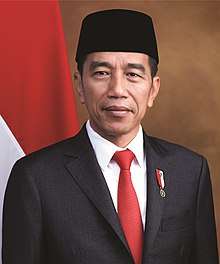 Official portrait, 2019 | |
| 7th President of Indonesia | |
| Assumed office 20 October 2014 | |
| Vice President | Jusuf Kalla (2014–2019) Ma'ruf Amin (2019–present) |
| Preceded by | Susilo Bambang Yudhoyono |
| 14th Governor of Jakarta | |
| In office 15 October 2012 – 16 October 2014 | |
| Deputy | Basuki Tjahaja Purnama |
| Preceded by | Fauzi Bowo |
| Succeeded by | Basuki Tjahaja Purnama |
| 15th Mayor of Surakarta | |
| In office 28 July 2005 – 1 October 2012 | |
| Deputy | F. X. Hadi Rudyatmo |
| Preceded by | Slamet Suryanto |
| Succeeded by | F. X. Hadi Rudyatmo |
| Personal details | |
| Born | Mulyono 21 June 1961 Surakarta, Central Java, Indonesia |
| Political party | PDI-P |
| Spouse(s) | |
| Children | Gibran Rakabuming Raka Kahiyang Ayu Kaesang Pangarep |
| Mother | Sudjiatmi |
| Father | Widjiatno Notomiharjo |
| Residence | Bogor Palace, Merdeka Palace |
| Alma mater | Gadjah Mada University |
| Signature | |
| Website | Presidential website |
| ||
|---|---|---|
|
Pre-presidency
Elections
Incumbent
Policy
Summits
Family
 |
||
He achieved national prominence in 2009 for his work as the Mayor of Surakarta. A member of the Indonesian Democratic Party of Struggle (PDI-P), he was named as the party's candidate for the 2012 Jakarta gubernatorial election, alongside Basuki Tjahaja Purnama (often known as Ahok)[2] as his running mate.[3] Defeating incumbent Fauzi Bowo,[4] he took office in October 2012 and reinvigorated Jakartan politics, introducing publicised blusukan visits (unannounced spot checks)[5] and improving the city's bureaucracy, reducing corruption in the process. He also introduced years-late programs to improve quality of life, including universal healthcare, dredging the city's main river to reduce flooding, and inaugurating the construction of the city's subway system.[6]
The PDI-P nominated Jokowi, who was already seen as a rising star in Indonesian politics, for the 2014 presidential election.[7] Winning a majority of the popular vote, he was named president-elect on 22 July 2014, to bitter protest from his opponent Prabowo Subianto, who disputed the outcome and withdrew from the race before the count was completed.[8][9] As president, Jokowi has primarily focused on infrastructure, introducing or restarting long-delayed programs to improve connectivity in the Indonesian archipelago.[10] On foreign policy, his administration has emphasised "protecting Indonesia’s sovereignty",[11] with the sinking of illegal foreign fishing vessels[12] and the prescription of capital punishment for drug smugglers, despite intense pressure from foreign powers including Australia and France.[13][14] He was re-elected in 2019 for a second five-year term, again defeating Prabowo Subianto.[15]
Early life and career
Joko Widodo was born Mulyono on 21 June 1961 and is of Javanese descent.[1] He is the eldest of four siblings and is the only son of Noto Mihardjo (father) and Sudjiatmi Notomihardjo (mother). He has three younger sisters, named Iit Sriyantini, Ida Yati, and Titik Relawati.[16][17] His father came from Karanganyar, while his grandparents came from a village in Boyolali.[18] Jokowi was often sick as a toddler, and his name was thus changed—a common practice in Javanese culture—to Joko Widodo, with widodo meaning "healthy" in Javanese.[1] At the age of 12, he started working in his father's furniture workshop.[19][20] Throughout his childhood, Jokowi's family constantly faced evictions from their landlords; this greatly affected him, and later in his career, he organised medical housing in Surakarta during his years as mayor of the city.[21]
Education and business career
Jokowi's education began at State Elementary School 111 Tirtoyoso, known for being a school for less wealthy citizens.[22] He continued his studies in State Junior High School 1 Surakarta,[23] and later wanted to attend State Senior High School 1 Surakarta, but failed the entrance exam and instead enrolled in State Senior High School 6 Surakarta.[24] Jokowi graduated from the Forestry faculty at Gadjah Mada University, Yogyakarta, in 1985, where his work included studies and research on the use of plywood. He later began work at PT Kertas Kraft Aceh (id), a state-owned firm in the province of Aceh, Sumatra.[25] He worked in what is today Bener Meriah Regency between 1986 and 1988, as a supervisor of forestry and raw materials of a Pinus merkusii plantation.[26][27]
Jokowi, however, soon became uninterested in his activities in the firm and returned home. He then began working in his grandfather's furniture factory for a year before establishing his own company, Rakabu, whose namesake is his first child. The company, which mainly focused on teak furniture, nearly went bankrupt at one point but survived following a Rp 500 million loan from Perusahaan Gas Negara. By 1991, the company began exporting its products, and they were successful in international markets. The firm first established a presence in the European market in France, and it was a French customer named Bernard who gave Joko Widodo the nickname "Jokowi".[25][28][29]
By 2002, Jokowi had become the chairman of Surakarta's furniture manufacturers association.[29] Ultimately he decided to become a politician and promote reform in his home town, Surakarta, after seeing the neat layouts of some European cities while promoting his furniture there.[20] After becoming mayor, he also made a joint venture with politician and former lieutenant general Luhut Binsar Pandjaitan, when the two founded PT Rakabu Sejahtera (from Rakabu and Luhut's PT Toba Sejahtera).[30][31]
Jokowi reported his net worth in 2018 to be Rp 50.25 billion (US$3.5 million), mostly in the form of property holdings in Central Java and Jakarta.[32]
Political career
Mayor of Surakarta
After first joining PDI-P in 2004, Jokowi ran in the mayoral race in Surakarta in 2005 with F. X. Hadi Rudyatmo as his running mate, with the support of PDI-P and the National Awakening Party.[33][34] The pair won 36.62% of the vote against the incumbent Slamet Suryanto and two other candidates. During the campaign, many questioned his background as a property and furniture businessman. However, one academic paper claimed his leadership style was successful because it established an interactive relationship with the people, through which he was able to induce people's strong faith in him.[35] He adopted the development framework of European cities (which he frequently travelled to as a businessman) as a guide for changes in Surakarta.[36]
Jokowi's notable policies as mayor included:[37] Building new traditional markets & renovating existing markets, constructing a 7-km city walk with a 3-meter wide pedestrian walkway along Surakarta's main street, revitalising the Balekambang and Sriwedari parks, employing stricter regulations on cutting down trees along the city's main streets, rebranding the city as a centre of Javanese culture and tourism under the tagline 'The Spirit of Java', promoting the city as a centre for meetings, incentives, conventions and exhibitions (MICE), launching healthcare and education insurance program for all residents, a local bus rapid transit system named Batik Solo Trans and a Solo Techno Park, which helped support the Esemka Indonesian car project.[38] It was during his tenure as mayor that he conducted the blusukan, an impromptu visit to specific areas to listen to people's issues, which proved popular later in his political career. He also prohibited his family members from bidding for city projects, therefore suppressing the risk of corruption.
His supporters pointed to rapid positive changes in Surakarta under his leadership and the branding the city with the motto 'Solo: The Spirit of Java'. While in office he successfully relocated antique stalls in the Banjarsari Gardens without incident, a helpful move in revitalising the functions of the open green land; he emphasised the importance of business firms engaging in community activities; he improved communications with the local community by appearing regularly on local television. As a follow-up of the new branding of the city, he applied for Surakarta to become a member of the Organization of World Heritage Cities, which was approved in 2006, and subsequently had the city chosen to host the organisation's conference on October 2008. In 2007, Surakarta had also hosted the World Music Festival (Festival Musik Dunia/FMD) which was held at the complex of Fort Vastenburg near the centre of the city. The FMD in 2008 was held in the Mangkunegaran Palace Complex.
Part of Jokowi's style was his populist 'can-do' (punya gaye) elements designed to build bonds with the broad electorate.[35] As mayor, he became personally involved in an incident just before Christmas 2011 when the Surakarta municipality had overdue bills of close to $1 million (Rp 8.9 billion) owed to the state-owned electricity company Perusahaan Listrik Negara (PLN). Following its policy of pursuing a more disciplined approach to collecting overdue bills, it imposed a blackout on street lights in the city just before Christmas. The city government quickly authorised payment but in settling the bill protested that the PLN should consider the public interest before taking such action. To reinforce the point, Jokowi made a highly publicised personal visit to the local PLN office to deliver the Rp 8.9 billion in cash in the form of hundreds of bundles of notes and even small coins.[39]
In 2010, he was re-elected for a second term, again running with Hadi. They won 90.09% of the vote, losing in only a single polling station.[40] He was later chosen as the 'Tempo Leader of Choice' by Tempo news magazine (2008) and received a 'Changemakers Award' from Republika newspaper (2010); his name also started being considered in national polls for the governorship of Jakarta, long before PDI-P's nomination, including those by University of Indonesia and Cyrus Network (2011).[35]
Governor of Jakarta
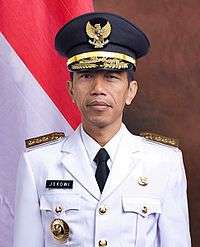
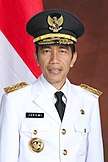
Jokowi won the 2012 gubernatorial election in Jakarta after a runoff round against incumbent Fauzi Bowo.[4] His inner circle of advisers in Jakarta was reported to include people such as FX Hadi 'Rudy' Rudyatmo, Sumartono Hadinoto, and Anggit Nugroho who were colleagues while he was mayor of Surakarta as well as Basuki Tjahaja Purnama ("Ahok"), his deputy as governor of Jakarta.[41] Jokowi continued the blusukan practice he had adopted as mayor of Surakarta by regularly visiting population centres, especially slums. During these visits, he wore simple, informal clothes and stopped at markets or walked along narrow Jakarta alleys to listen and witness firsthand about issues addressed by residents such as the price of food, housing difficulties, flooding, and transportation. Polling and media coverage suggested that Jokowi's hands-on style proved very popular both in Jakarta and elsewhere across Indonesia.[42]
After taking office, taxes and the provincial budget of Jakarta increased significantly from Rp 41 trillion in 2012 to Rp 72 trillion in 2014.[43][44] Both Jokowi and Ahok publicised their monthly salary and the provincial budget.[45][46] They also initiated programs aimed towards transparency, such as online taxes, e-budgeting, e-purchasing, and a cash management system.[45] Moreover, all meetings and activities that were attended by Jokowi and Ahok were recorded and uploaded on YouTube.[47]
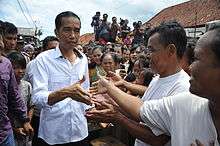
In healthcare, Jokowi introduced a universal health care program, the 'Healthy Jakarta Card' (Kartu Jakarta Sehat, KJS).[48] It involved an insurance program provided through state-owned insurance company PT Askes Indonesia (Persero) and a plan to regulate health charges for treatment for over 20,000 services and procedures.[49] The program was criticised for confusion over details of the implementation and long queues,[50] though Jokowi defended it and counselled patience. In education, Jokowi launched the 'Smart Jakarta Card' (Kartu Jakarta Pintar, KJP) on 1 December 2012, to help needy students. It gives an allowance that can be withdrawn from ATMs for buying school needs such as books and uniforms.[51]
His administration's other notable policies include a system of bureaucratic recruitment called lelang jabatan (literally 'auction of office position'), giving every civil servant the same opportunity to achieve a certain position by fulfilling the required qualifications,[52] regulation of the chaotic agglomeration of street vendors in Pasar Minggu and Pasar Tanah Abang,[53][54] the dredging and reservoir normalisation projects to reduce flooding,[55][56][57] and the inauguration of long-delayed Jakarta MRT and Jakarta LRT.[58][59] As governor, Jokowi also appointed of a non-Muslim 'lurah' (subdistrict chief) for the Muslim majority subdistrict of Lenteng Agung in spite of protests by some residents.[60]
In handling squatters, Jokowi had been reported to Komnas HAM (Indonesian Human Rights Board) for human rights abuse after the eviction of the squatters near Pluit. In previous "political contracts", Jokowi had vowed not to evict residents to distant locations.[61][62]
Presidential candidacies
2014
Megawati Sukarnoputri nominated Jokowi to be the presidential candidate of her party.[7]
Following the release of Quick Count results from many different polls, Jokowi declared victory on 9 July. However, his opponent Prabowo Subianto also declared victory, creating confusion among the population.[63] On 22 July, hours before the announcement of the election results, Prabowo withdrew.[64] Jokowi's victory was expected and realised hours later.[65][64] The General Elections Commission (KPU) gave him a close victory with 53.15% of the vote (almost 71 million votes), to Prabowo's 46.85% (62 million votes),[66] though Prabowo's camp disputed these totals.[67]
After his victory, Jokowi stated that growing up under the authoritarian and corrupt New Order regime, he would have never expected someone with a lower-class background to become president. The New York Times reported him as saying "now, it's quite similar to America, yeah? There is the American dream, and here we have the Indonesian dream".[68] Jokowi was the first Indonesian president outside the military or the political elite, and the political commentator Salim Said gave the popular view of the politician as "someone who is our neighbour, who decided to get into politics and run for president."[68]
2019
In 2018, Jokowi announced that he would run for re-election next year. His vice president Jusuf Kalla was not eligible for another term because of the term limits set for president and vice president. Kalla had already served a five-year term as vice president during Susilo Bambang Yudhoyono's first term (2004-2009). Speculation surrounding Jokowi's choice of running mate focused on several candidates including Mahfud MD, a former defence minister and chief justice of the Constitutional Court. In a surprise move, Jokowi announced that Ma'ruf Amin would be his running mate. Mahfud had reportedly been preparing for the vice-presidential candidacy. Ma'ruf was selected instead following a push by several constituent parties of Jokowi's governing coalition and influential Islamic figures.[69] Explaining his decision, Jokowi referred to Ma'ruf's extensive experience in government and religious affairs.[70]
The KPU officially announced that the Jokowi-Amin ticket had won the election in the early hours of 21 May 2019.[71] The official vote tally was 85 million votes for Jokowi (55.50%) and 68 million votes for Prabowo (44.50%).[72] Supporters of Prabowo protested in Jakarta against the result, and it turned into a riot which left eight people dead and over 600 injured.[73] Following the protests, Prabowo's campaign team launched a Constitutional Court lawsuit but was rejected in its entirety.[74]
Presidency of Indonesia
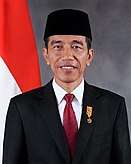
.jpg)
Government and cabinets
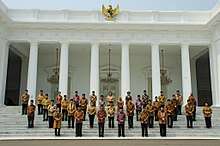
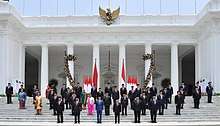
Despite vowing not to give government positions simply to political allies during the 2014 campaign, many members of political parties received ministerial positions in Jokowi's first cabinet.[75][76] The first year of Jokowi's administration saw him controlling a minority government, until Golkar, the second-largest party in the People's Representative Council (DPR), switched from opposition to the government. Jokowi denied accusations of having interfered with Golkar's internal affairs, although admitted that Luhut may have influenced the change.[77] His cabinet's Minister of Industry Airlangga Hartarto was elected chairman of Golkar in 2018.[78] The National Mandate Party (PAN) had also switched sides beforehand but later returned to being the opposition in 2018.[79][80]
Jokowi announced the 34 names in his cabinet on 26 October 2014.[81] While the cabinet was praised for inclusiveness of women, with Retno Marsudi becoming Indonesia's first female foreign minister, it received criticism for several perceived political inclusions such as Puan Maharani (daughter of Megawati Sukarnoputri).[82] The Jokowi administration also saw the formation of two new ministries (Ministry of Public Works and Housing and Ministry of Environment and Forestry) from a merger of old ministries, in addition to renaming and reorganisation of other ministries.[83] In total, he conducted three cabinet reshuffles until 2018, removing ministers such as Rizal Ramli and Bambang Brodjonegoro while including ministers such as Luhut and World Bank Director Sri Mulyani Indrawati.[84]
He came under fire from his own political party for other policy weakness and one lawmaker from his own party, Effendi Simbolon, said he should be impeached.[85] On 9 April 2015, during a PDI-P congress, his party's chair, former President Megawati Sukarnoputri, alluded to him as a functionary. Megawati noted the mechanism of a presidential election in which a political party nominates a candidate, as a hint that his position was owed to his PDI-P nomination and implying that it is natural for the president to carry out the party's political policy line.[86][87] Several months prior, Megawati and Jokowi had disputed over the appointment of a new police chief, with Megawati supporting her former adjutant Budi Gunawan while Jokowi supported Badrodin Haiti.[77][88][89]
Following his re-election, Jokowi announced his second cabinet on 23 October 2019. He retained several ministers such as Sri and Luhut, but also included the founder of Go-Jek Nadiem Makarim and two-time presidential rival Prabowo Subianto, as education and defence ministers respectively.[90]
Economy
Before taking office, Jokowi sought for outgoing President SBY to take responsibility for the decision to further increase fuel prices[91] by further removing subsidies.[92] Previous attempts by SBY to do so had resulted in civil unrest.[91] On 1 January 2015, Jokowi took measures which on the surface appeared to reduce fuel subsidies.[93][94] The policy stirred up some demonstrations, with Jokowi citing it as necessary to increase funding for the infrastructure, education and health sectors.[95] However, since March 2015, the government has set the price of Premium-branded gasoline far below the market price, causing the fuel subsidy to be incurred by state-owned oil company Pertamina instead of the direct government account.[96] Additionally, the government also implemented a single-price program, aiming to sell fuel through official channels at the same price nationally including in isolated parts of Kalimantan and Papua. The government claimed that this was achieved in 2017.[97]
In the first quarter of 2015, year-on-year GDP grew 4.92%, and in the second quarter, it grew 4.6%, the lowest figure since 2009.[98][99][100] Since then, growth has remained above the 5% mark, which is still below what is considered healthy economic growth mark of 6%.[101] The Indonesian rupiah has also weakened throughout Jokowi's administration, with its exchange rate per US dollar briefly passing Rp. 15,000 in 2018, the lowest level since the 1997 Asian financial crisis.[102] The year-on-year inflation in June 2015 was 7.26%, higher than in May (7.15%) and June the year before (6.7%).[103]
Jokowi's administration continued the resource nationalism policy of its predecessor, nationalising some assets controlled by multinational companies such as Freeport McMoRan, Total SA and Chevron. In 2018, in a move aimed to cut imports, oil companies operating in Indonesia were ordered to sell their crude oil to state-owned Pertamina.[104]
Infrastructure development has been a significant feature of the Jokowi administration, with a focus on the road and railway expansion, seaports and airports development, and irrigation. In 2016, the state budget allocated Rp 290 trillion (US$22 billion) for infrastructure, the biggest in Indonesian history.[105] In total, his administration planned 265 infrastructure projects starting in 2016.[106] In September 2015, Indonesia awarded a $5.5 billion high-speed rail project to China,[107][108] to Japan's disappointment, who is also vying for the project.[109] Indonesia's transportation ministry laid out a litany of shortcomings in plans for the project, casting doubt on the project and spotlighting Jokowi's limits in turning mega-projects into reality as he tries to draw foreign investors.[110] Other significant projects include the completion of the 4,325-kilometer Trans Papua road and the Trans-Java Toll Road,[111][112] initial construction of the Trans-Sulawesi Railway[113] and the Trans-Sumatra Toll Road,[114] a US$50 billion plan to develop the maritime sector including 24 "strategic ports",[115] and expansion of airport capacity in remote areas.[116] The ports' development and modernisation program, dubbed the "Sea Toll Road" program, was aimed to reduce price inequality between the better developed western parts of the country and the less populated eastern parts.[117]
In addition to the major projects, the Jokowi administration also implemented a village fund program in which villages across the country received funding to allocate on basic infrastructures such as roads and water supply, tourism development and village enterprises to improve rural economies.[118][119] The initial campaign promise was that Rp 1.4 billion (around US$100,000) would be allocated for every village annually,[120] though as of 2019 less than Rp 1 billion was allocated.[121] Between 2015 and 2018, Rp 187 trillion (US$14 billion) had been reallocated through the program.[122] The administration has targeted to streamline land certification across the country, aiming to distribute certificates of land ownership across the country completely. It involved increasing the issuing rate of certificates from around 500,000 to several million annually.[123][124] In 2016, the administration signed into law a tax amnesty bill following a lengthy public debate and push back, giving wealthy Indonesians a chance to declare their unreported assets before the government would strengthen rules and oversight around imports and exports. It became the most successful program of its kind in history, with over Rp. 4,865 trillion (approximately US$366 billion) of previously unreported assets declared to the tax office.[125][126]
The aggressive spending on infrastructure and the resulting increase in Indonesia's national debt - an increase of 48% between 2014 and March 2018 to US$181 billion - was criticised by the opposition.[127] In April 2018, Jokowi also issued new policy which allowed foreign workers in Indonesia without Indonesian language skills requirement,[128] reasoning that it would increase investments.[129] The policy faced significant opposition from local labor unions, who claimed that the policy would increase unemployment rates.[130][131]
Politics
Early in his first term, the opposition coalition within the People's Representative Council attempted to revoke a regulation (Perppu, Government Regulation in Lieu of Acts) issued by Jokowi's predecessor, which had guaranteed the holding of direct regional elections in Indonesia (and overrode a legislator-issued bill which arranged for indirect elections).[132] Jokowi supported the direct regional elections and opposed attempts to revoke the regulation, stating that "direct regional elections was, in principle, non-negotiable".[133] Within the first three years of his administration, Jokowi issued four such Perppu.[134]
Human rights
Judicial executions in Indonesia are carried out under a Presidential Decree following a death sentence imposed by a trial court.[135] Jokowi has stated that he refused to grant any clemency for drug offenders facing execution and argued that Indonesia was in a state of emergency over drug-related crimes, citing statistics the Jakarta Globe reported to be faulty.[136][137] This stance drew criticism not only as it could harm relations with the native countries of the condemned convicts,[138] but also because it imperils Indonesia's own citizens facing the death penalty abroad.[139][140]
After multiple executions in 2015, Australia, Brazil and the Netherlands recalled their ambassadors from Indonesia.[13][141] Australia reduced its foreign aid to Indonesia by nearly half,[142] and Amnesty International issued a condemnation saying they showed a "complete disregard for due process and human rights safeguards."[143] Former Indonesian constitutional court chief justice Jimly Asshiddiqie, who was a key player in the anti-death penalty lobby in Jakarta, said the push for the execution of Australians Myuran Sukumaran and Andrew Chan had come from Jokowi personally.[144] Furthermore, the Sydney Morning Herald reported that Jokowi did not have or read related documents when he refused their clemency requests.[145] In the same year, Jokowi granted Frenchman Serge Atlaoui and Filipino Mary Jane Veloso temporary reprieves due to pending legal appeals.[145] As of 2017, around 260 people remain on death row in Indonesia.[146]
In early 2016, his administration proposed a new anti-terrorism law to replace the previous one made in 2003. Following the Surabaya bombings of 2018, the worst terrorist attack on Indonesian soil since the 2002 Bali bombings, the controversial bill passed, allowing the Indonesian National Armed Forces to participate in counter-terrorism activities given presidential approval and police requests.[147] The law also allowed extended detention of terrorism suspects and permitted the use of wiretapping without initial court approval.[148] Jokowi himself threatened to issue a replacement law (Perppu) if the bill did not pass the parliament by June that year.[149] He also supported a controversial 2017 bill on mass organisations, which upon passing saw the Indonesian branch of the Hizb ut-Tahrir being disbanded. He stated that the law was a necessity to defend the national ideology Pancasila.[150]
Although a government-supported symposium to resolve human rights violations following the 1965 30 September Movement was held in 2016, Jokowi stated that his government would not apologise to the victims of the Indonesian mass killings of 1965–66.[151][152] On LGBT rights, Jokowi stated that "there should be no discrimination against anyone", but added that "in terms of our beliefs, [the LGBT lifestyle] isn't allowed, Islam does not allow it."[153]
Under his presidency, the controversial transmigration program was cut once more, when in 2015 the decision was made to end the migration program to the Papuan provinces of the east from Java.[154]
Many people were arrested for their posts on social media that were deemed insulting to Jokowi.[155][156] The arrests were considered by observers as a violation of freedom of speech, hence contradicting the constitution.[157][158] Moreover, the government's plans to resurrect a Dutch colonial law which would permit imprisonment for insulting the president resulted in widespread protests.[159][160] After the protests, a Law Firm and Public Interest Law Office (AMAR) institution reported receiving a lot of complaints of students regarding threats and sanctions of expulsion or suspension from their schools and universities.[161]
After publishing a controversial magazine cover with a caricature of Jokowi with Pinocchio long nose, the magazine Tempo was reported to the police by a group claiming to be Jokowi's supporters for insulting the president.[162][163] The Presidential Palace later issued a statement regarding the Tempo affair that "the President respected freedom of press and speech".[164] A remission granted to a journalist's murderer also became a source of controversy before its revocation following media pressure.[165][166] A book critical of Jokowi titled Jokowi Undercover was banned upon release. Its author was arrested and sentenced to three years in prison.[167] Buyers of the book were advised to surrender their copies to the authorities.[168]
In the aftermath of the 2019 election protests, Amnesty International's Indonesian office denounced the repressive actions against the demonstrators, and condemned them as a grave human rights abuse, also demanding the government to take responsibility to investigate the extrajudicial executions in the clash.[169]
Internet access in Indonesia was restricted several times between 2018 and 2019, such as during the post-election riots in May 2019 and the Papua protests in August 2019. Komnas HAM called the shutdown as a human rights abuse by the government.[170][171][172]
Foreign policy
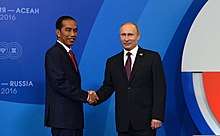
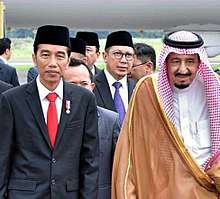
Before Jokowi's election, Indonesia's foreign policy under former President SBY was moulded by the mission statement, "A thousand friends and zero enemies".[173] Jokowi has mandated a three-pronged policy of maintaining Indonesia's sovereignty, enhancing the protection of Indonesian citizens, and intensifying economic diplomacy.[11]
Jokowi aspires Indonesia to become a global maritime power (Indonesian: poros maritim dunia or global maritime axis). He sees the sea would have an increasingly important role in Indonesia's future, and that as a maritime country, Indonesia must assert itself as a force between the two oceans: the Indian Ocean and the Pacific Ocean. The five pillars of this maritime-axis doctrine are rebuilding Indonesia's maritime culture, maintaining and managing marine resources, developing maritime infrastructure and connectivity as well as developing the shipping industry and maritime tourism, inviting other nations to cooperate in the marine field and eliminate the source of conflicts at sea, and developing maritime defence forces.[174] As part of this vision, Jokowi has adopted a tougher stance on illegal fishing.[175] He stated that Jakarta could no longer tolerate a situation in which over 5,000 ships are operating illegally in its waters every day, making a mockery out of Indonesian sovereignty and resulting in annual losses of over $20 billion.[176][177]
On the territorial disputes in the South China Sea, particularly in the Natuna Islands where China's nine-dash line intercepts Indonesian EEZ claims, Jokowi stated that "there will be no compromise on sovereignty",[178] and renamed Indonesia's section of the waters in the South China Sea as "North Natuna Sea".[179] In June 2016, he held a cabinet meeting off the islands aboard the Indonesian Navy corvette KRI Imam Bonjol, calling to step up maritime patrols in the area.[180] Under his administration, Indonesia has released an "Indo-Pacific Vision" for ASEAN countries, which calls for regional architecture and considers the Indian and Pacific Oceans as a single interconnected geostrategic area.[181] Indonesia also entered a trilateral cooperation agreement with Malaysia and the Philippines, allowing coordinated patrols in the pirate-infested Sulu Sea.[182]
In the Muslim world, Jokowi released a statement calling for the Muslim leaders at the Organisation of Islamic Cooperation summit meeting in Jakarta to unite in reconciliation and push for Palestinian independence.[183] Under Jokowi, Indonesia's Foreign Minister has visited Palestine but refused entreaties to establish bilateral diplomatic relations with Israel.[184] An honorary consul was established in Ramallah in the West Bank though it had to be inaugurated in Amman, Jordan.[185] Jokowi also condemned the persecution of Rohingya Muslims in Myanmar and oversaw the departure of four Indonesian Air Force transport planes with 34 tons of relief supplies for Rohingya refugees in Bangladesh.[186][187]
Capital relocation
By April 2019, it was made public that Jokowi had decided in a meeting with cabinet ministers to move the capital of Indonesia away from Jakarta to a location outside Java.[188] On 25 August 2019, it was further announced that the new capital would be located in Kalimantan, between the regencies of North Penajam Paser and Kutai Kartanegara.[189]
Family and personal life
Jokowi married his wife Iriana in 1986. The couple has two sons and one daughter. Their first son, Gibran Rakabuming Raka (born 1 October 1987), studied abroad in Sydney and Singapore (at the Management Development Institute of Singapore, MDIS) and currently runs a catering and wedding-planning business in Surakarta. Their only daughter, Kahiyang Ayu (born 20 April 1992), completed an undergraduate degree in food technology at the state-owned Sebelas Maret University in Surakarta. Their second son, Kaesang Pangarep (born 25 December 1994), completed his high school years in ACS International, Singapore,[190] and is an online vlogger. Jokowi has two grandchildren, born in 2016 and 2018 from Gibran and Kahiyang, respectively.
Jokowi has been described as "Muslim but broadly secular in his outlook",[191] and 2019, his statement that religion and politics should be separated caused a public debate on whether he was promoting secularism in the country.[192] In June 2013, a film titled Jokowi, depicting Jokowi's childhood and youth, was released.[193] He expressed some objections to the film saying that he felt his life had been a simple one and was not worthy of being adapted into a film.[194]
Several members of Jokowi's family has declared their intentions to enter politics by running as a candidate to local government (mayors and regents). His first son Gibran has declared his candidacy for the mayoralship of Surakarta, in addition to his son-in-law Bobby Nasution (Medan) and brother-in-law Wahyu Purwanto (Gunung Kidul Regency).[195]
Interest in rock music
According to The Economist, Jokowi "has a penchant for loud rock music" and owned a bass guitar signed by Robert Trujillo of heavy metal band Metallica, that was confiscated by the anti-corruption commission, KPK.[196] He is also a fan of Lamb of God, Led Zeppelin and Napalm Death. On 2 November 2013, while he was the Governor of Jakarta, he was seen in the rock festival Rock in Solo in casual dress.[197] In November 2017, Danish Prime Minister Lars Løkke Rasmussen, who was on an official visit to Jakarta, gave Jokowi a Metallica Master of Puppets vinyl box set as a diplomatic gift. It was signed by the band's drummer and co-founder, Lars Ulrich, a Danish native.[198] In accordance with his policy of transparency, Jokowi paid 11 million rupiah ($800) out of his personal funds to claim the record, which had been declared a state asset to avoid accusations of corruption.[199]
Awards and honours
- National honours






.png)






_-_ribbon_bar.png)

- Foreign honours
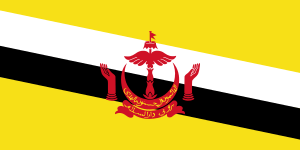

.jpg)


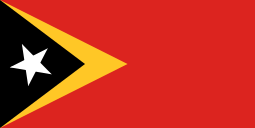



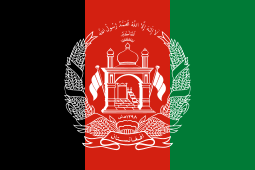
- Medal of Ghazi Amanullah – 29 January 2018[208]
- Other
2008: Listed by Tempo as one of the 'Top 10 Indonesian Mayors of 2008'.[209]
2012: Ranked 3rd at the 2012 World Mayor Prize for "transforming a crime-ridden city into a regional centre for art and culture and an attractive city to tourists".[210]
2013: Listed as one of "The Leading Global Thinkers of 2013" in Foreign Policy magazine. In February 2013 he was nominated as the global mayor of the month by the City Mayors Foundation, based in London.[211]
2014: Listed by Fortune as one of "The World's 50 Greatest Leaders".[212]
2016–2017: List by "The Muslim 500" as one of the most influential Muslims in the world, which ranked 11 in 2016 and 13 in 2017.[213][214]
References
- "Kisah Mulyono Menjadi Joko Widodo". Retrieved 27 July 2018.
- Tempo.Co. "Asal Mula Basuki Tjahaja Dipanggil Ahok | balaikota | tempo.co". Tempo News. Retrieved 21 October 2016.
- "Naik Kopaja, Jokowi – Ahok Daftar Jadi Cagub DKI" (in Indonesian). Tempo. 19 March 2012.
- "Editorial: Jokowi's real battle". The Jakarta Post. 22 September 2012. Retrieved 3 December 2016.
- Banyan (21 January 2014). "No ordinary Jokowi". The Economist. Retrieved 31 August 2017.
- "Indonesia's rock governor". www.aljazeera.com. Al Jazeera. 4 April 2014. Retrieved 31 August 2017.
- 'Governor of Jakarta Receives His Party’s Nod for President', The New York Times, 14 March 2014.
- "Jakarta governor Widodo wins Indonesian presidential election". Indonesia News.Net. Archived from the original on 20 October 2014. Retrieved 23 July 2014.
- Thatcher, Jonathan; Kapoor, Kanupriya (23 July 2014). "Indonesian president-elect Jokowi calls for unity after bitter election". Reuters. Retrieved 31 August 2017.
- hermes (27 January 2018). "Jokowi chasing $196b to fund 5-year infrastructure plan". The Straits Times. Retrieved 22 April 2018.
- "The Trouble With Indonesia's Foreign Policy Priorities Under Jokowi". The Diplomat. Retrieved 25 July 2015.
- Chan, Francis (2 April 2017). "Indonesia blows up and sinks another 81 fishing boats for poaching". Straits Times. Retrieved 31 August 2017.
- "Bali Nine executions, Indonesia responds to Australia withdrawing Ambassador". 29 April 2015.
- Halim, Haeril (22 July 2017). "Jokowi orders police to gun down foreign drug traffickers". The Jakarta Post. Retrieved 31 August 2017.
- Beech, Hannah; Suhartono, Muktita (20 May 2019). "Joko Wins Re-Election in Indonesia, Defeating Hard-Line Former General". The New York Times. Retrieved 21 May 2019.
- Anggriawan, Fiddy (20 September 2012). "Jokowi Kenalkan Adik dan Ibu Kandungnya ke Publik". Okezone.com. Archived from the original on 20 September 2012. Retrieved 29 March 2014.
- Hasyim Widhiarto and Kusumari Ayuningtyas, 'Furniture business propels Jokowi's path to prominence', The Jakarta Post, 30 June 2014.
- Dihadapan Pimpinan Muhammadiyah, Jokowi Bantah Anti Islam Archived 23 July 2015 at the Wayback Machine diakses dari situs Metro TV News pada tanggal 26 May 2014.
- "Jokowi Anak Tergusur Mau Jadi Gubernur". Beritasatu.com. 11 April 2012. Archived from the original on 26 June 2012. Retrieved 29 March 2014.
- Segu, Vinsensiu (16 July 2012). "Dari Bantaran Kali Menuju DKI-1". Inilah.com. Retrieved 29 March 2014.
- "Jokowi Kecil, Rumah Digusur, Tiga Kali Pindah Kontrakan". Tribunnews. 21 September 2012. Retrieved 29 March 2014.
- Alim, Abdul (22 September 2012). "Ratusan siswa SD Jokowi gelar aksi syukur". SINDOnews.com (in Indonesian). Retrieved 21 July 2018.
- Sunaryo, Arie (10 August 2013). "Sejak SMP, Jokowi sudah dikenal pendiam tapi pintar". Merdeka.com. Retrieved 29 March 2014.
- "Gagal Masuk SMA Favorit, Jokowi Sakit Tipus dan Pendiam". Tribunnews. 23 September 2012. Retrieved 29 March 2014.
- Samah, Kristin; Susanti, Fransisca Ria (2014). Saya Sujiatmi, Ibunda Jokowi (in Indonesian). Gramedia Pustaka Utama. ISBN 9786020304441.
- Iqbal, M. (2 March 2016). "Jokowi Ajak Makan Siang Para Sahabat Lamanya Saat Bekerja di Aceh". detikNews (in Indonesian). Retrieved 13 October 2018.
- "Kisah Kehidupan Jokowi di Gayo". Media Indonesia (in Indonesian). 13 January 2018. Retrieved 10 March 2019.
- "How a French connection gave Indonesia 'Jokowi'". The Jakarta Post. 20 October 2014.
- "Bagaimana Jokowi Bangun Pabrik Mebel Rakabu yang Terbakar?". Tempo (in Indonesian). 20 April 2016. Retrieved 13 October 2018.
- "Jokowi Sudah Lama Bekerjasama dengan Luhut Panjaitan". rmol.co (in Indonesian). 30 March 2014. Retrieved 28 September 2018.
- Santoso, Teguh Budi (20 September 2018). "Mengapa Publik (Terpaksa) Harus Menerima Paket Jokowi-Ma'ruf Amin?". tirto.id (in Indonesian). Retrieved 28 September 2018.
- Mahardhika, Maulana (15 August 2018). "Ini Daftar Harta Kekayaan Jokowi". KOMPAS (in Indonesian). Retrieved 1 December 2018.
- "Sejarah Pemerintahan". Pemerintah Kota Surakarta. Archived from the original on 23 January 2017. Retrieved 4 November 2017.
- "Begini Perjalanan Politik Jokowi, Si 'Capres Kerempeng'". detikNews (in Indonesian). 20 October 2014. Retrieved 13 October 2018.
- Cahyadi Indrananto (June 2012) Pemimpin Daerah Sebagai Agen: Dramaturgi dalam Komunikasi Politik Walikota Solo Joko Widodo / Local Leaders as Agents: Dramaturgy on Political Communications of City Mayor Joko Widodo of Solo, Postgraduate Thesis.
- Joko Wididi Raih Penghargaan Best City Award Asia Tenggara – Best City Award Delgosea Joko Widodo penataan PKL walikota solo
- Sita W. Dewi and Kusumasari Ayuningtyas, 'Poor stagnate while city thrives', The Jakarta Post, 18 November 2013.
- Kusumasari Ayuningtyas, 'Surakarta mayor uses car made by vocational school students' Archived 24 December 2013 at the Wayback Machine, The Jakarta Post, 3 January 2012.
- Kusumasari Ayuningtyas, 'Residents of Surakarta accompany mayor to pay PLN', The Jakarta Post, 4 January 2012.
- "Kemenangan Fenomenal Jokowi-Rudy". KOMPAS (in Indonesian). 21 May 2010. Retrieved 3 August 2018.
- See the several reports by Sita W. Dewi and Kusumasari Ayuningtyas: 'Jokowi's star appeal: Making hay while sun shines', The Jakarta Post, 18 November 2013; 'The inner circle', The Jakarta Post, 19 November 2013; Sita W. Dewi, 'Man of the house, man of the moment', The Jakarta Post, 20 November 2013.
- Editorial: Start working, Jokowi', 22 January 2013, The Jakarta Post.
- Dipimpin Jokowi, Pendapatan DKI naik Rp 31 Triliun dalam Setahun. bisniskeuangan.kompas.com. 17 March 2014
- Pernyataan PAD 72 Triliun diralat sebagai APBD, bukan PAD oleh Kepala Dinas Pelayanan Pajak DKI Jakarta Iwan Setiawandi
- "Menlu Inggris dukung transparansi Jokowi". BBC. 28 January 2014. Retrieved 15 March 2014.
- Jordan, Ray (14 March 2013). "Transparansi Jokowi, Ini Dia Poster APBD 2013". Detik. Retrieved 15 March 2014.
- Juwari, Ahmad (14 November 2012). "Ini Alasan Jokowi Setuju Rapat Pemprov DKI Ditampilkan di Youtube". Detik. Retrieved 15 March 2014.
- Tom McCawley (November 2013) "Overdue Antidote" Archived 24 December 2013 at the Wayback Machine, Development Asia, Asian Development Bank.
- '"Jokowi-care" a pilot project for upcoming national health plan', The Jakarta Post, 22 December 2013.
- 'A report card for Jakarta's healthcare program', The Jakarta Post, 22 December 2013.
- Kartu Jakarta Pintar Diluncurkan. Antara. 15 March 2014
- "Leading and shaping a unified, high performing APS". Australian Public Service Commission. Archived from the original on 25 July 2015. Retrieved 24 July 2015.
- "Jokowi Resmikan Lokasi Baru 'PKL' Pasar Minggu". Republika Online. 13 November 2013.
- Detik. 21 August 2013
- Diplomasi Makan Siang Jokowi dan Warga Waduk Pluit Berlanjut Pekan Depan. Detik. 22 March 2014
- BPBD: Berkat Kerja Jokowi Banjir 2014 Tak Separah 2013. Liputan6. 15 March 2014
- Perdana Menteri Belanda Nilai Jokowi Pemimpin Hebat. merdeka. 15 March 2014
- "Proyek Pembangunan MRT Jakarta Resmi Dimulai". VOA Indonesia. 10 October 2013. Retrieved 15 March 2014.
- Raditya Margi (9 September 2015). "Jokowi kicks off LRT construction". The Jakarta Post. Jakarta. Retrieved 21 September 2015.
- "Jokowi Stands by Christian Subdistrict Head.html". The Jakarta Post. Retrieved 9 October 2019.
- "Alami kekerasan, Warga Waduk Pluit laporkan Jokowi ke Komnas HAM". Merdeka (in Indonesian). 27 August 2013. Retrieved 18 May 2020.
- "'Remember your promises,' city's poor tell Jokowi in daily rallies". 16 March 2016. Retrieved 9 October 2019.
- Jokowi and Prabowo both claim victory in early Indonesian election results . The Guardian. 10 July 2014. Retrieved 22 July 2014
- Yolanda Ryan Armindya (22 July 2014). "KPU Postpones Election Results Announcement". Tempo. Archived from the original on 22 July 2014. Retrieved 22 July 2014.
- Novrida Manurung, Rieka Rahadiana and Yoga Rusmana (22 July 2014). "Widodo Heads for Indonesia Win as Prabowo Withdraws From Count". Bloomberg. Retrieved 22 July 2014.CS1 maint: uses authors parameter (link)
- "Indonesia elections: Jakarta governor 'Jokowi' wins but rival rejects final results". The Daily Telegraph. Archived from the original on 22 July 2014. Retrieved 22 July 2014.
- "Prabowo camp says PKS tally more accurate than KPU's". The Jakarta Post. 22 June 2014. Archived from the original on 22 July 2014. Retrieved 22 July 2014.
- Joe Cochrane (22 July 2014). "Joko Widodo, Populist Governor, Is Named Winner in Indonesian Presidential Vote". The New York Times. Archived from the original on 22 July 2014. Retrieved 22 July 2014.
- Marguerite Apra Sapiie, 'Jokowi may pick Mahfud MD as running mate', The Jakarta Post, 9 August 2018.
- Sita W. Dewi, 'Who is Ma'ruf Amin, Jokowi's running mate?', The Jakarta Post, 9 August 2018.
- Post, The Jakarta. "KPU names Jokowi winner of election". The Jakarta Post. Retrieved 9 March 2020.
- Prasongko, Dias (20 May 2019). "KPU Menetapkan Jokowi-Ma'ruf Unggul 55.50 Persen". Tempo (in Indonesian). Retrieved 20 May 2019.
- Medistiara, Yulida (23 May 2019). "Anies: 8 Orang Meninggal Dunia dalam Aksi 21-22 Mei". detiknews (in Indonesian). Retrieved 24 May 2019.
- "BREAKING: Court rejects Prabowo's vote-rigging claims". The Jakarta Post. Retrieved 28 June 2019.
- "Jokowi Tidak Ada Namanya Bagi-Bagi Kursi Menteri". Merdeka. Retrieved 9 October 2019.
- "Jokowi Tak Seberani Janjinya 16 Kursi untuk Parpol Jelas Bagi-bagi Kekuasaan". Kompas. Retrieved 9 October 2019.
- Suzuki, Jun (9 June 2016). "Widodo gets second wind for reforms". Nikkei Asian Review. Retrieved 12 October 2018.
- McBeth, John (18 January 2018). "Can this man save Indonesia's Golkar?". Asia Times. Retrieved 12 October 2018.
- "PAN joins the ruling collation". The Jakarta Post. 2 September 2015. Retrieved 12 October 2018.
- Putri, Parastiti Kharisma; Ramdhani, Jabbar (10 August 2018). "PAN Oposisi, Menteri PAN-RB Bakal Mundur?". detiknews (in Indonesian). Retrieved 12 October 2018.
- "Jokowi Announces Names of Cabinet Members". Tempo. 26 October 2014. Retrieved 12 October 2018.
- "Jokowi praised for record number of women in Cabinet". The Straits Times. 31 October 2014. Retrieved 12 October 2018.
- Akuntono, Indra (23 October 2014). "Ini Nama Kementerian yang Berubah dalam Kabinet Jokowi-JK". KOMPAS (in Indonesian). Retrieved 12 October 2018.
- Cook, Erin (27 January 2018). "What Does Indonesia's New Cabinet Reshuffle Mean for Jokowi's Future?". The Diplomat. Retrieved 12 October 2018.
- Aritonang, Margareth (28 January 2015). "PDI-P lawmaker slams Jokowi's policies". Jakarta Post.
- Ging Ginanjar (9 April 2015). "Megawati tegaskan posisi PDIP atas Pemerintah Jokowi". BBC Indonesia (in Indonesian). Retrieved 6 July 2015.
- Hartcher, Peter (28 April 2015). "Indonesian President Widodo under corrupt thumb of Megawati". The Sydney Morning Herald. Retrieved 14 April 2017.
- "Cerita Syafii Soal Kenapa Megawati Kukuh Sokong Budi Gunawan". Tempo (in Indonesian). 4 March 2015. Retrieved 12 October 2018.
- "Budi Gunawan Batal Dilantik, Ternyata Ini Reaksi Megawati". Tempo (in Indonesian). 22 February 2015. Retrieved 12 October 2018.
- Ars Aditya; Viriya Singgih (22 October 2019). "Jokowi's Cabinet Is a Blend of Politicians, Tycoons, and Technocrats". Bloomberg. Retrieved 3 November 2019.
- "Indonesia fuel prices rocket by 44% sparking protests". BBC. BBC. 22 June 2013. Retrieved 23 July 2015.
- Irviani, Koman (28 August 2014). "Jokowi fails to persuade Yudhoyono on fuel subsidy". Jakarta Post. Retrieved 23 July 2015.
- "Indonesia—Moving in a New Direction". IMF Survey. 19 March 2015. Retrieved 23 July 2015.
- Fitri Wulandari; Eko Listiyorini; Sharon Chen (31 December 2014). "Widodo Makes Biggest Change to Indonesia Fuel Subsidies: Economy". Bloomberg. Retrieved 18 July 2015.
- Dion Bisara; Muhamad Al Azhari (31 December 2014). "Jokowi Eyes Infrastructure Focus With Fuel Subsidy Cut". Jakarta Globe. Archived from the original on 20 November 2014. Retrieved 18 November 2014.
- "Jokowi worries 'big forces' hampering govt projects, policies". Jakarta Post. 3 August 2015. Retrieved 3 August 2015.
- "Government achieves 2017 single-fuel price target: Minister". Antara News. 8 January 2018. Retrieved 18 July 2018.
- Brummitt, Chris (4 May 2015). "Wakeup Call for President Widodo". Bloomberg L.P. Retrieved 25 July 2015.
- "Indonesian economic growth continues decline as Q2 figures show drop to 2009 levels". Australian Broadcasting Corporation. 7 August 2015. Retrieved 7 August 2015.
- Sheridan, Greg (25 June 2015). "Indonesia's Jokowi presidency is becoming a desperate mess". The Australian. Newscorp. Retrieved 25 July 2015.
- "Jokowi Heads to 2018 With Backing of Stronger Indonesian Economy". Bloomberg.com. 27 December 2017. Retrieved 4 April 2018.
- Kiesche, Liz (5 September 2018). "Indonesian rupiah breaches 15,000 per U.S. dollar then eases off". Seeking Alpha. Retrieved 18 September 2018.
- Samosir, Agnes (21 July 2015). "News Summary". ANU Indonesia Project. Retrieved 25 July 2015.
- "Economic nationalism is back in Indonesia as election approaches". The Straits Times. 17 September 2018. Retrieved 18 September 2018.
- Ayomi Amindoni (23 March 2016). "Jokowi policy attracts infrastructure-based mutual funds". The Jakarta Post. Retrieved 18 April 2016.
- Salna, Kalris (26 January 2018). "Indonesia Needs $157 Billion for Infrastructure Plan". Bloomberg. Retrieved 18 July 2018.
- "Indonesia to award fast train contract to China - Japanese embassy official". Reuters. 29 September 2015. Retrieved 1 October 2015.
- "Indonesia awards multi-billion-dollar railway project to China over Japan". ABC. 30 September 2015. Retrieved 1 October 2015.
- Robin Harding in Tokyo; Avantika Chilkoti in Jakarta; Tom Mitchell in Beijing (1 October 2015). "Japan cries foul after Indonesia awards rail contract to China". Financial Times. Retrieved 1 October 2015.
- Otto, Ben (3 February 2016). "Indonesia's High-Speed Rail Plan Goes Off the Tracks". Wall Street Journal. Retrieved 13 June 2016.
- McBeth, John (2 October 2017). "Rough road ahead for powder keg Papua". Asia Times. Retrieved 18 July 2018.
- "Jokowi optimistic Trans Java toll road fully completed in 2019 - ANTARA News". Antara News. 23 June 2018. Retrieved 18 July 2018.
- "Kereta Api Trans Sulawesi Beroperasi April 2018". Okezone (in Indonesian). 7 March 2017. Retrieved 18 July 2018.
- "Groundbreaking Trans-Sumatra Toll Road; Infrastructure Projects Indonesia". Indonesia Investments. 30 April 2015. Retrieved 27 September 2018.
- "Indonesia sneaks up on Singapore with flurry of port projects". Nikkei Asian Review. Retrieved 18 July 2018.
- "Jokowi Seeks Investors for Indonesia's Airports to Curb Deficit". Bloomberg. 9 November 2016. Retrieved 18 July 2018.
- "New Chief Maritime Minister to Speed up Sea Toll Road Program". Jakarta Globe. 28 July 2016. Retrieved 3 January 2019.
- "Indonesia Tries Rural Development - Asia Sentinel". Asia Sentinel. 20 March 2018. Retrieved 18 July 2018.
- "New village scheme risks quality". The Jakarta Post. 15 December 2017. Retrieved 18 July 2018.
- "Pilpres 2014, 9 Program Nyata Jokowi Janji Naikkan Kesejahteraan PNS". SoloPos. 3 July 2014. Retrieved 9 October 2019.
- Jannah, Selfie Miftahul (15 January 2020). "Dana Desa Meningkat, Tiap Desa Rata-Rata Dapat Rp960 Juta Tahun Ini". tirto.id (in Indonesian). Retrieved 18 May 2020.
- Kusuma, Hendra (14 May 2018). "Jokowi Kucurkan Rp 187 Triliun untuk Program Dana Desa". Detik (in Indonesian). Retrieved 18 July 2018.
- "Indonesian president hands over land certificates in Papua". Radio New Zealand. 12 April 2018. Retrieved 31 July 2018.
- "Government to complete land certificate distribution by 2025: Jokowi". Antara News. 29 December 2017. Retrieved 31 July 2018.
- Setiaji, Hidayat (31 March 2017). "Late rush to join Indonesia tax amnesty after $360 billion declared". Reuters. Retrieved 9 October 2018.
- Indrawati, Sri Mulyani. "Tax Amnesty Program Indonesia Ended, What Are the Results?". Indonesia Investments. Retrieved 22 April 2018.
- "Indonesia's government debt ahead of 2019 presidential election: a real economic concern?". The Conversation. 28 June 2018. Retrieved 3 January 2019.
- "Jokowi Minta Syarat Bisa Bahasa Indonesia Untuk Pekerja Asing Dihapus". Detikcom. Retrieved 9 October 2019.
- "New Regulation On Foreign Workers Part Of Administrative Reform Jokowi.html". The Jakarta Post. Retrieved 9 October 2019.
- "Opposition Questions Jokowi's Policy On Foreign Workers.html". The Jakarta Post. Retrieved 9 October 2019.
- "Aturan Pekerja Asing Dilonggarkan, Jumlah TKA Tahun Ini Ditaksir Naik 20%". Bisnis.com (in Indonesian). 12 September 2019. Retrieved 18 May 2020.
- "Batalkan Pilkada Tak Langsung, Presiden SBY Terbitkan 2 Perppu!". KOMPAS.com (in Indonesian). 2 October 2014. Retrieved 3 November 2019.
- "Jokowi: Pilkada Langsung Tidak Bisa Ditawar". Berita Satu (in Indonesian). 5 December 2014. Retrieved 3 November 2019.
- "Tiga Tahun Jadi Presiden, Ini Empat Perppu yang Diteken Jokowi". akurat.co (in Indonesian). 15 July 2017. Retrieved 3 November 2019.
- "Penetapan Presiden Nomor 2 Tahun 1964". Pidana. 17 April 1964. Retrieved 23 July 2015.
- Ina Parlina; Margareth S. Aritonang; Severianus Endi (21 January 2015). "Jokowi refuses to budge on clemency issue". The Jakarta Post. Retrieved 6 July 2015.
- Claudia, Stoicescu (6 February 2015). "Indonesia's Executions of Drug Convicts Based on Faulty Stats". Jakarta Globe. Archived from the original on 4 August 2015. Retrieved 16 July 2015.
- Peter Alford; Brendan Nicholson (5 March 2015). "Diplomacy doomed to fail Andrew Chan and Myuran Sukumaran". The Australian. Retrieved 23 July 2015.
- Sarah Gill (5 March 2015). "Capital punishment — Jokowi's twin policy positions". Jakarta Post. Retrieved 8 August 2015.
- "Indonesia's Death Penalty Hypocrisy". 3 March 2015. Retrieved 2 April 2016.
- Arshad, Arlina (19 January 2015). "Brazil and the Netherlands recall ambassadors after Indonesian executions". Sydney Morning Herald.
- "Federal budget 2015: Foreign aid to Indonesia cut by nearly half, Africa aid down 70 per cent". Sydney Morning Herald. Fairfax Media. 13 May 2015. Retrieved 23 July 2015.
- "Indonesia executes drug smugglers by firing squad". Al Jazeera. Al Jazeera. 29 April 2015.
- Bachelard, Michael (12 August 2015). "Schapelle Corby made it harder to save Andrew Chan and Myuran Sukumaran". Fairfax Media. Retrieved 12 August 2015.
- Bachelard, Michael (19 February 2015). "Bali nine executions: Indonesia's President did not have all the documents when he refused clemency". Sydney Morning Herald. Fairfax Media.
- "Death Penalty Worldwide". Cornell University Law School. Retrieved 12 October 2018.
- Diela, Tabita (25 May 2018). "Indonesia toughens up anti-terror laws days after worst attack in years". Reuters. Retrieved 31 July 2018.
- Wahyudi, Soeriaatmadja (25 May 2018). "Indonesia's anti-terror Bill to extend detention". The Straits Times. Retrieved 12 October 2018.
- Ihsanuddin (14 May 2018). "Jika pada Juni RUU Antiterorisme Belum Selesai, Jokowi Terbitkan Perppu". KOMPAS (in Indonesian). Retrieved 31 July 2018.
- Stefanie, Christie (26 October 2017). "Jokowi Tegaskan UU Ormas untuk Lindungi Pancasila". CNN Indonesia (in Indonesian). Retrieved 27 September 2018.
- "Jokowi Rules Out Apology to Defunct Communist Party for 1965". Jakarta Globe. 28 June 2016. Retrieved 3 January 2019.
- Kwok, Yenni (19 April 2016). "No Apologies at Indonesia's First Hearing Into 1965 Massacre". Time. Retrieved 3 January 2019.
- Parmar, Tekendra (20 October 2016). "Indonesian President Speaks Out Against Anti-LGBT Rhetoric". Time. Retrieved 3 January 2019.
- "Jokowi Hentikan Transmigrasi ke Papua".
- "9 Kasus Penghinaan Presiden Jokowi Berujung Bui". Liputan6. 21 August 2017. Retrieved 9 October 2019.
- "10 Orang Ini Ditahan Karena Hina Jokowi". Kompasiana. Retrieved 9 October 2019.
- "Pasal Penghinaan Presiden Pada RKUHP Dianggap Bersifat Kolonial". Kompas. Retrieved 9 October 2019.
- "Pasal Penghinaan Presiden Warisan Kolonial Dibatalkan MK Dan Langgar UUD". Detikcom. Retrieved 9 October 2019.
- Lamb, Kate (24 September 2019). "Thousands protest against new criminal code in Indonesia". The Guardian.
- "Perjalanan Kasus Remaja Yang Ancam Tembak Jokowi Tak Ditahan Dan Dikembalikan Ke Orangtuanya". Tribunnews. Retrieved 9 October 2019.
- Briantika, Adi (5 October 2019). "Pembungkaman ala Forum Rektor dan Jokowi: Larang Mahasiswa Demo". tirto.id (in Indonesian). Retrieved 18 May 2020.
- "Kontroversi Cover Tempo Saat Kritik Lewat Karya Dinilai Menghina Presiden". Tirto. Retrieved 9 October 2019.
- "PDIP Tak Terima Sampul Majalah Tempo Sandingkan Jokowi Dan Pinokio". Tirto. Retrieved 9 October 2019.
- Sugiharto, Jobpie (26 September 2019). "Cover Majalah Tempo, Istana: Presiden Hormati Kebebasan Pers". Tempo (in Indonesian). Retrieved 18 May 2020.
- "AJI Denpasar Lambasts Jokowi For Granting Remission To Journalists Murderer". The Jakarta Post. Retrieved 9 October 2019.
- "Presiden Jokowi Batalkan Remisi Untuk Pembunuh Wartawan". Kompas. Retrieved 9 October 2019.
- "Jokowi Undercover Author Sentenced To Three Years In Prison". The Jakarta Post. Retrieved 9 October 2019.
- "Buyers Urged To Hand Over Copies Of Jokowi Undercover To Authorities". The Jakarta Post. Retrieved 9 October 2019.
- "Amnesty International Report". Amnesty International. Retrieved 9 October 2019.
- "Pembatasan Sementara WhatsApp cs Hingga Dibuka Kembali". Detikcom. Retrieved 9 October 2019.
- "Komnas HAM Pemblokiran Internet Di Papua Melanggar HAM". Kompas. Retrieved 9 October 2019.
- "Kronologi Blokir Internet Papua Berujung Vonis untuk Jokowi". CNN Indonesia. Retrieved 19 August 2020.
- "Indonesia's New Foreign Policy - 'Thousand friends- zero enemy'". Institute for Defence Studies and Analyses. Retrieved 25 July 2015.
- Rendi A. Witular (13 November 2014). "Jokowi launches maritime doctrine to the world". The Jakarta Post. Retrieved 14 April 2016.
- Chan, Francis (2 April 2017). "Indonesia blows up and sinks another 81 fishing boats for poaching". The Straits Times. Retrieved 10 October 2018.
- Prashanth Parameswaran (13 January 2015). "Explaining Indonesia's 'Sink The Vessels' Policy Under Jokowi". The Diplomat. Retrieved 18 July 2015.
- "Terapi kejut Jokowi bagi pencuri ikan asing". Okezone.com. 10 December 2014. Retrieved 15 April 2018.
- "No compromise on sovereignty over Natuna Islands despite China claims: Indonesia's Jokowi". The Straits Times. 5 November 2016. Retrieved 21 August 2018.
- Allard, Tom (14 July 2017). "Asserting sovereignty, Indonesia renames part of South China Sea". Reuters U.K. Retrieved 21 August 2018.
- Kapoor, Kanupriya (22 June 2016). "Indonesia president visits islands on warship, makes point to China". Reuters. Retrieved 21 August 2018.
- Laksmana, Evan (20 November 2018). "Indonesia's Indo-Pacific vision offers an alternative to picking sides". South China Morning Post. Retrieved 3 January 2019.
- Weatherbee, Donald E. (2017). "Indonesia's Foreign Policy in 2016: Garuda Hovering". Southeast Asian Affairs: 172. ISSN 0377-5437. JSTOR 26492600.CS1 maint: ref=harv (link)
- Liza Yosephine (7 March 2016). "Jokowi calls for unity for reconciliation in Palestine". The Jakarta Post. Retrieved 7 March 2016.
- "Indonesia rejects Israel's latest call for bilateral relations". 31 March 2016. Retrieved 18 April 2016.
- Weatherbee 2017, p. 173.
- "The Latest: Indonesia sends 34 tons of aid for Rohingya". ABC News. Archived from the original on 22 September 2017. Retrieved 14 September 2017.
- "Indonesian President Jokowi deplores violence against Rohingya". Channel NewsAsia. Retrieved 14 September 2017.
- Sapiie, Marguerite Afra (29 April 2019). "Jokowi wants to move capital out of Java". The Jakarta Post. Retrieved 25 September 2019.
- "Bloomberg - Are you a robot?". Bloomberg. Retrieved 25 September 2019.
- Widhiarto, Hashim; Dewi, Sita W. (20 October 2014). "First Family stays cool, won't parade wealth". The Jakarta Post. Retrieved 14 April 2017.
- "Indonesian politics are becoming less predictable". The Economist. 5 October 2017.
- "Jokowi Accused Of Promoting Secularism". The Jakarta Post. Retrieved 9 October 2019.
- ngapocak (20 June 2013). "Jokowi (2013)". IMDb.
- 'Tak Ada Izin, Jokowi Keberatan Film "Jokowi" ', Kompas, 22 May 2013.
- "Ini Alasan 4 Keluarga Jokowi Berniat Maju Pilkada 2020". KOMPAS.com (in Indonesian). 19 January 2020. Retrieved 16 June 2020.
- 'Banyan: Mr Joko goes to Jakarta', The Economist, 8 June 2013.
- Jokowi Nonton Konser Rock hingga ke Solo. regional.kompas.com. 3 November 2013
- Maine, Samantha (29 November 2017). "Danish Prime Minister gives gift of Metallica boxset to Indonesian President". NME. Retrieved 30 November 2017.
- Meixler, Eli (23 February 2018). "Indonesia's President Paid $800 to Keep a Limited-Edition Metallica Album". Time. Retrieved 23 February 2018.
- "Inilah 30 Nama Penerima Bintang Tanda Jasa 2011". Tempo (in Indonesian). 12 August 2011. Retrieved 27 September 2018.
- "Tanda Kehormatan yang dimiliki Presiden" (in Indonesian). Direktorat Jenderal Kebudayaan Kementerian Pendidikan dan Kebudayaan Republik Indonesia. 10 May 2019. Retrieved 23 August 2019.
- Piri, Sally (8 February 2015). "HM confers state decoration on Indonesian President". The Brunei Times. Archived from the original on 8 February 2015. Retrieved 8 February 2015.
- "Jokowi meets Indonesian migrant workers in Brunei". Thai PBS. 9 February 2015. Archived from the original on 12 March 2017. Retrieved 14 April 2017.
- "Ke Brunei, Jokowi Hadiri Perayaan 50 Tahun Sultan Hassanal Bolkiah Bertahta". 6 October 2017. Retrieved 9 June 2019.
- "Jokowi Receives King Abdul Azis Medal". 12 September 2015. Retrieved 12 September 2015.
- "President Jokowi Receives Highest Medal of Honour from Timor Leste". 26 January 2016. Archived from the original on 5 March 2017. Retrieved 26 January 2016.
- "Jokowi bestows highest medal to Swedish king". 22 May 2017. Retrieved 19 June 2017.
- Sani, Ahmad Faiz Ibnu (30 January 2018). "Jokowi Receives Ghazi Amanullah Medal from Afghan President". Tempo. Retrieved 30 January 2018.
- "Sedikit Orang Baik di Republik yang Luas". Tempo (in Indonesian). 22 December 2008. Retrieved 27 September 2018.
- "World Mayor: The 2012 results". www.worldmayor.com. Retrieved 22 August 2018.
- Brian Baker (1 February 2013) Mayor of the Month for February 2013 – Joko Widodo (Jokowi) Governor of Jakarta. citymayors.com
- "Fortune ranks the World’s 50 Greatest Leaders" Archived 23 March 2014 at the Wayback Machine. Fortune. 20 March 2014
- "The Muslim 500". themuslim500.com.
- Mei 2017, Rizki Akbar Hasan21; Wib, 16:00 (21 May 2017). "Jokowi di Peringkat 13 Muslim Paling Berpengaruh di Dunia". liputan6.com.CS1 maint: numeric names: authors list (link)
Further reading
- Majeed, Rushda (2012). "The City With a Short Fuse." Foreign Policy. September.
- Majeed, Rushda (2012). "Defusing a Volatile City, Igniting Reforms: Joko Widodo and Surakarta, Indonesia, 2005–2011." Innovations for Successful Societies. Princeton University. Published July.
- McCawley, Peter (2014). Joko Widodo's Indonesia: Possible future paths, Australian Strategic Policy Institute, Canberra.
External links
| Wikimedia Commons has media related to Joko Widodo. |
| Wikiquote has quotations related to: Joko Widodo |
| Political offices | ||
|---|---|---|
| Preceded by Slamet Suryanto |
Mayor of Surakarta 2005–2012 |
Succeeded by F. X. Hadi Rudyatmo |
| Preceded by Fauzi Bowo |
Governor of Jakarta 2012–2014 |
Succeeded by Basuki Tjahaja Purnama |
| Preceded by Susilo Bambang Yudhoyono |
President of Indonesia 2014–present |
Incumbent |
.jpg)
